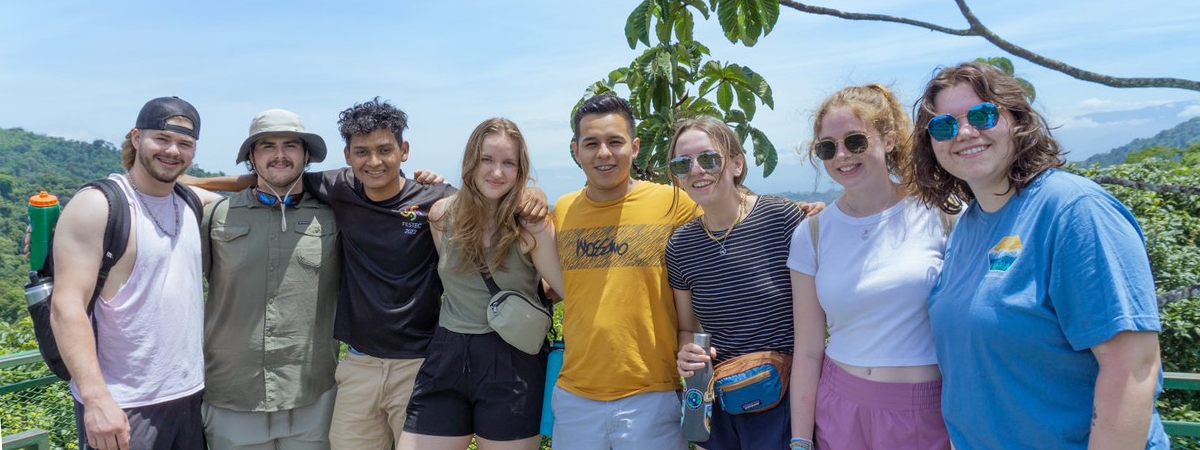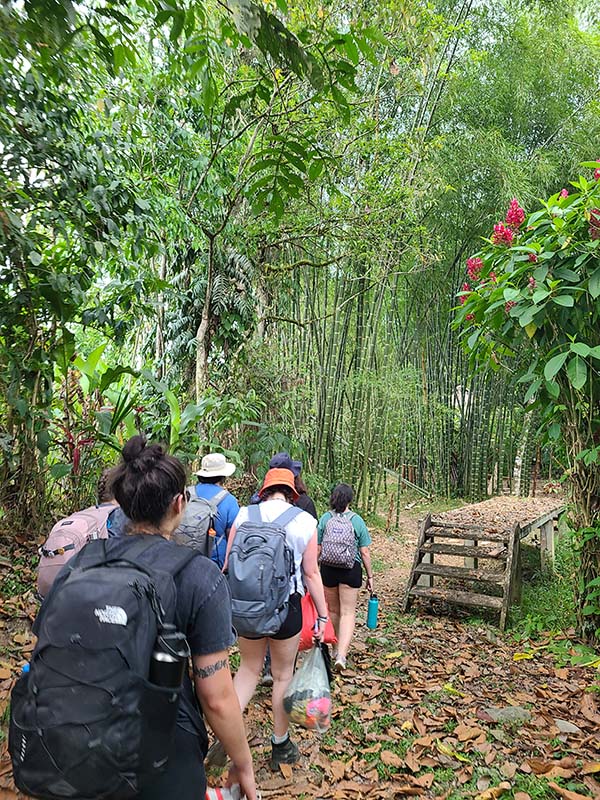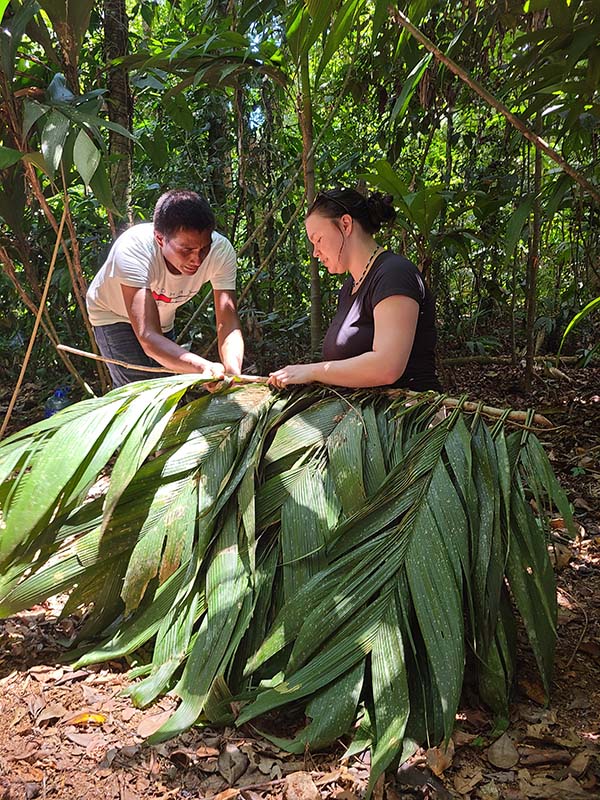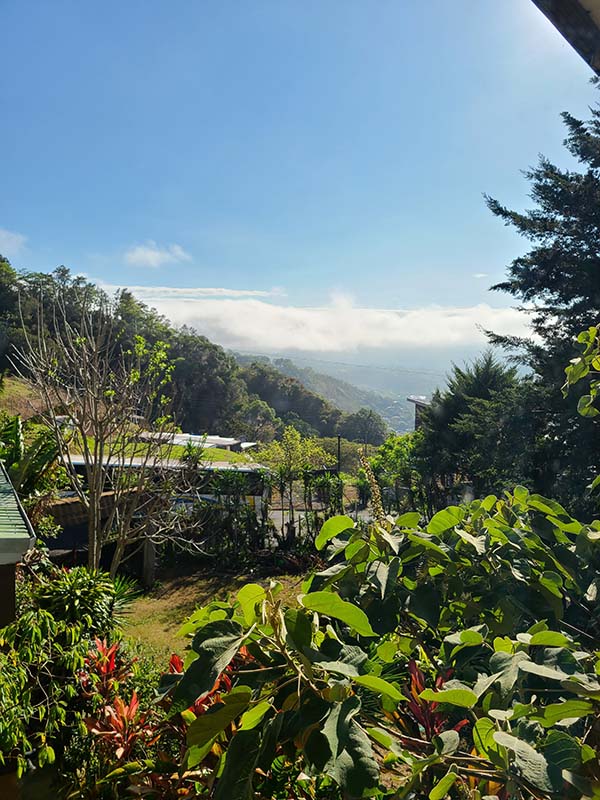Nipissing students return from Costa Rica with new knowledge on sustainable development

(Left to Right) Owen Woodall, Ethan Boyd, Ferdi (TEC), Andreah Miles, Jordani (TEC) Caitlyn Aasman, Keely Hussey, Page Chartrand
Twelve students from several departments (Geography, Biology, Indigenous Studies, Criminology, Gender Equality and Social Justice, Philosophy) at Nipissing University recently embarked on faculty-led field course to Costa Rica.
Led by Dr. Dan Walters, Interim Dean of the Faculty of Arts and Science, the course offered a unique opportunity for students to learn about sustainable development efforts in the country.
“This field course provided students at Nipissing with a deeper understanding of sustainable development efforts happening outside of Canada as well as an enriching learning opportunity that will further enhance their academic experience,” shared Dr. Walters.
During this two-week international field experience, students visited Tecnológico de Costa Rica (TEC University) in Cartago to learn about the research and extension projects with indigenous and other community organizations, including sustainable tourism and agriculture production. They also travelled to Estacion Biologica (Organization of Tropical Studies) Las Cruces, a biological research station located in southern Costa Rica to take a guided tour of the station and learn about the ecosystem and efforts made to protect it.
Through the lens of the United Nations’ 17 Sustainable Development Goals (SDG), students had the opportunity to learn from Indigenous elders, students, and community members about their efforts to sustain culture, land, and economic opportunities for future generations.
“These communities have a deep respect for the natural world, acknowledging the environment as a source of life and a key element of their spirituality,” shared Caitlyn Aasman, geography student at Nipissing. “Conservation, preservation, and sustainability are the cornerstones to their ways of living, which was incredible to experience and observe firsthand.”
Aasman shared that in the communities they visited, they learned about traditional medicines, customary handmade goods, the history of colonialism, how to grow cacao and why cacao is spiritually important. Students also received an introduction to speaking the Indigenous Bribri language.
“These were each priceless experiences, and they taught me how culturally rich and profound the Indigenous culture of Costa Rica is,” she shared. “Ultimately, spending time with the Ngäbe, Brunca, and Bribri peoples taught me lessons about living sustainably, appreciating what we take from earth, and how deeply interconnected the natural world and human society are.”
Geography student, Ethan Boyd, shared that the greatest source for gathering a better understanding of human geography was interacting with local workers, students, and tour guides; experiences that cannot be gained through in-class instruction.
Having the opportunity to sit and exchange with other Indigenous peoples who have their own wealth of knowledge beyond colonial narratives, reinvigorated Page Nandawab-ikwe Chartrand’s love for these other ways of knowing, being, and doing. Page is currently pursuing her undergraduate degree in Indigenous Studies.
“As an Anishinaabekwe, what I found to be really impactful was the endless parallels and similarities between the many Indigenous peoples in Costa Rica and Indigenous peoples here,” said Page. “Some of the stories they shared with us sound just like the stories I grew up hearing, with a few variations.”
For Owen Woodall, this trip greatly impacted his education as he was able to physically experience the locations and demographics of the people and cultures that he has studied behind the comfort of a desk in a Canadian classroom.
“It is truly an amazing feeling to be able to experience the destination that I’ve learned about, and then seeing it with my own eyes,” he said.
Students also visited the Green Communities Project to understand their efforts to create sustainable agricultural practices among the local producers.
“I would say our time at Green Communities in Providencia had the greatest impact on me,” said Keely Hussey who is approaching her third year studying geography while enrolled in the Concurrent Education program in Nipissing’s Schulich School of Education. “At Green Communities, we spent time volunteering by helping fertilize saplings on the side of the mountain.”
This expedition was supported by the Global Skills Opportunity (GSO) funding of $483,000 that was secured in 2021. The GSO funding will support Transcultural Interdisciplinary Learning Experiences (TILE) through to 2025.
Global Skills Opportunity is a national outbound student mobility program that is expected to enable more than 16,000 Canadian college and undergraduate-level university students from across the country to acquire the global skills employers want and the Canadian economy needs. A key component of the Government of Canada’s International Education Strategy, Global Skills Opportunity is funded by Employment and Social Development Canada and is administered jointly by the Colleges Institute and Universities Canada.



